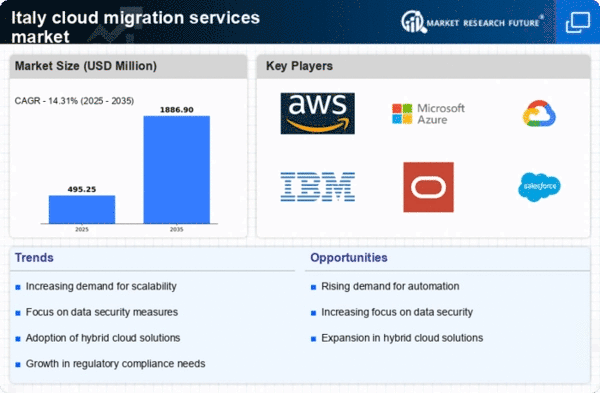Growing Demand for Scalability
The cloud migration-services market in Italy experiences a notable surge in demand for scalability solutions. Businesses increasingly seek to enhance their operational flexibility, allowing them to adjust resources according to fluctuating needs. This trend is particularly pronounced among small and medium-sized enterprises (SMEs), which represent a significant portion of the Italian economy. According to recent data, approximately 70% of SMEs in Italy express a desire to adopt scalable cloud solutions to support their growth strategies. As organizations migrate to the cloud, they can leverage on-demand resources, which can lead to improved efficiency and reduced costs. This growing demand for scalability is likely to drive innovation within the cloud migration-services market, as providers develop tailored solutions to meet the diverse needs of Italian businesses.
Emergence of Advanced Technologies
The cloud migration-services market in Italy is witnessing a transformative impact from the emergence of advanced technologies such as artificial intelligence (AI) and machine learning (ML). These technologies are increasingly integrated into cloud migration strategies, enabling organizations to optimize their processes and enhance decision-making capabilities. For instance, AI-driven analytics can provide insights into resource utilization, helping businesses make informed choices during migration. Furthermore, the integration of AI and ML can streamline the migration process, reducing downtime and improving overall efficiency. As Italian companies recognize the potential of these technologies, the demand for cloud migration services that incorporate AI and ML is expected to rise, thereby shaping the future landscape of the market.
Shift Towards Remote Work Solutions
The cloud migration-services market in Italy is significantly influenced by the shift towards remote work solutions. As organizations adapt to new work environments, the need for cloud-based tools and services has become paramount. This shift has prompted many businesses to migrate their operations to the cloud, facilitating collaboration and communication among remote teams. Recent surveys indicate that over 75% of Italian companies are investing in cloud solutions to support remote work initiatives. This trend not only enhances productivity but also allows organizations to maintain business continuity in uncertain times. Consequently, the demand for cloud migration services is likely to grow as companies seek to implement effective remote work strategies, further propelling the cloud migration-services market.
Regulatory Compliance and Data Sovereignty
The cloud migration-services market in Italy is shaped by the increasing emphasis on regulatory compliance and data sovereignty. Italian businesses are becoming more aware of the legal implications of data storage and processing, particularly in light of the General Data Protection Regulation (GDPR). This regulatory framework necessitates that organizations ensure data protection and privacy, which can complicate cloud migration efforts. As a result, many companies are seeking cloud migration services that not only facilitate compliance but also address data sovereignty concerns. It is estimated that around 60% of Italian enterprises prioritize compliance when selecting cloud service providers. This focus on regulatory adherence is likely to drive demand for specialized cloud migration services that can navigate the complexities of compliance in the Italian market.
Increased Investment in Digital Transformation
The cloud migration-services market in Italy is significantly influenced by the ongoing investment in digital transformation initiatives. Organizations across various sectors are allocating substantial budgets to modernize their IT infrastructure, with cloud migration being a pivotal component of this transformation. Recent statistics indicate that Italian companies are expected to invest over €10 billion in digital transformation by 2026, with a considerable portion directed towards cloud services. This investment is driven by the need to enhance operational efficiency, improve customer experiences, and remain competitive in an increasingly digital landscape. As businesses prioritize digital transformation, the demand for cloud migration services is anticipated to grow, fostering a robust environment for service providers in the market.
















